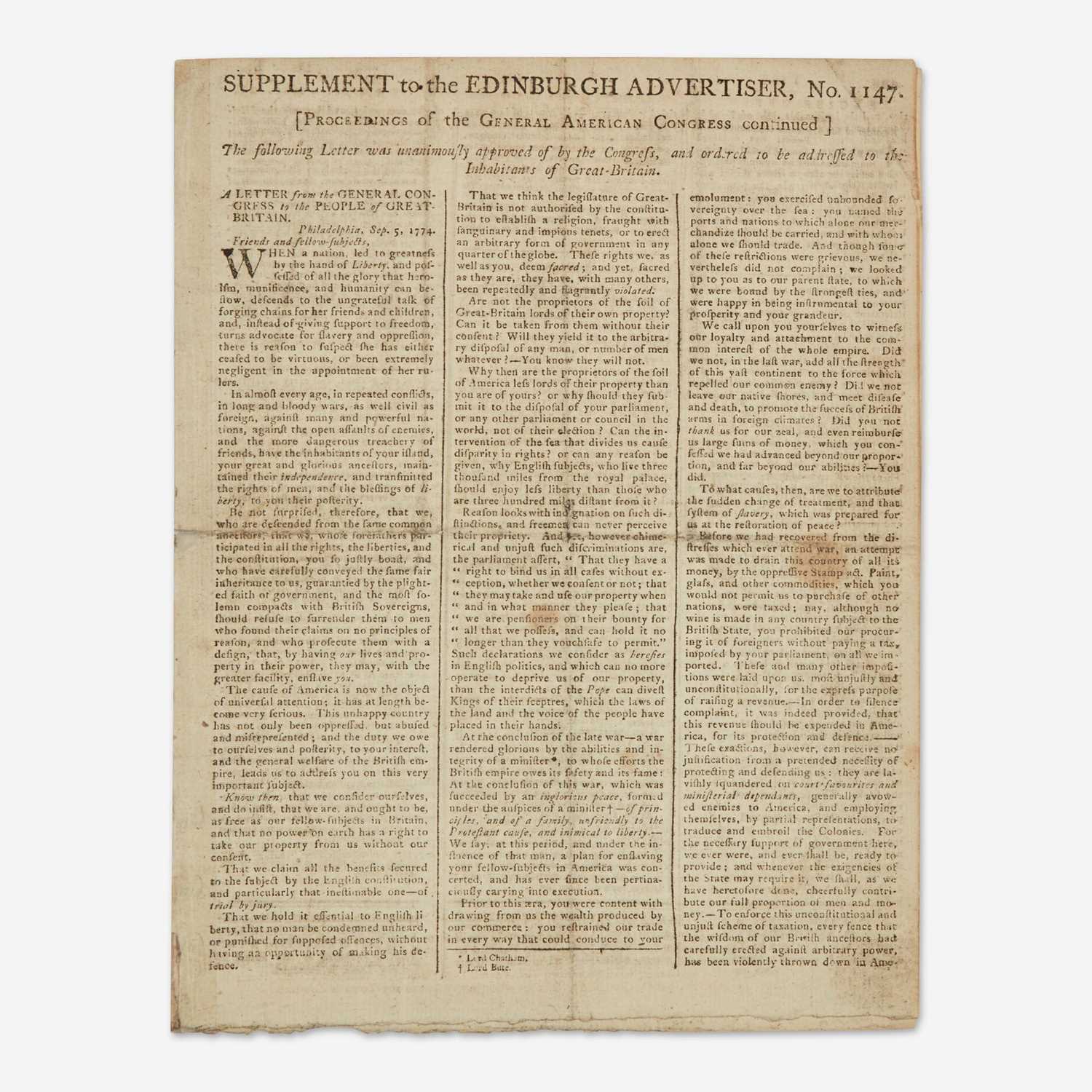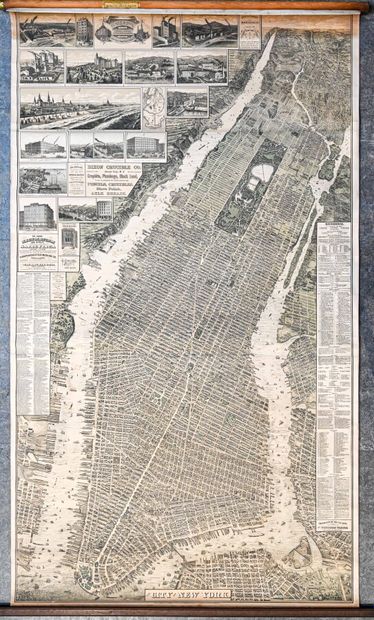Lambert, William. A Collection of Precedents, Consisting of Proceedings and Decisions on Questions of Order and Appeals, in the House of Representatives; and Disagreeing Votes of the Two Houses on Bills, &c. from the Commencement of the First Session of the First Congress, to the end of the Third Session of the Eleventh Congress, Inclusive; Prepared in Pursuance of a Resolution of the House of Representatives of the Twenty-sixth of April, 1810. Washington (DC): Printed by R.C. Weightman, 1811. 8 1/2 by 5 inches in a contemporary (original) red straight grain morocco binding with gilt rules and titling to the spine; 317, (index ix) pp. complete. As the title page outlines, the book is a collection of precedents, proceedings and decisions on questions of order and appeals representing the internal working or activities within the House of Representatives. Furthermore it describes the required interactions between the House and Senate. This basically deals with the establishment of committees created by each chamber for the purpose of working out differences so that bills or acts can be finalized and placed upon the President's desk for signing (or not). At the time of printing (1811) the House of Representatives saw a real need to compose this body of work by writing down the legislative steps, procedures, etc. which were found in practice to work effectively and efficiently to create laws and bills within the framework of the new Constitution. It was intended as a model of "precedents" for the use of future Congresses. The book, therefore, can be considered a natural sequel to the better-known "Federalist Papers" written by Madison, Hamilton and Jay. Those papers described the federal principles which were incorporated into the Constitution. This sequel describes the Federal Congressional rules and activities to bring the Constitution to life as an operational reality. The acts and laws created in these first Congresses outlines the early history of the nation. Topics addressed include: establishment of a post office and post roads; erection of forts for the protection of settlers; establishment of trading houses and rules regarding interactions with Indians; establishment of territories to eventually become states; establishment of an Army and Navy; establishment of means to collect internal revenue and customs, excise taxes, etc.; set up sales of national lands for pioneers and others; awarding national lands in lieu of payment for military service; establish licensing of ships; pass laws for protection of trade; establish light houses and other aids to navigation; establish mints to regulate coinage and control paper money; settlement of disputes between states and territories; authorization of money for treaties; provide for decennial censuses; establishment of departments and agencies for administration of government business. We find no records of earlier sales of this book. WorldCat shows only 16 library holdings (15 in the US, 1 in Switzerland). William Lambert was the clerk of the House of Representatives at the time of this summary of House activities. He appears also to have served as a clerk in the War Department and possibly Dept. of State, also. In his role as clerk, he engrossed the parchment copy of the proposed 12 first proposed constitutional amendments, the last 10 of which became the Bill of Rights. He was an amateur astronomer and regularly corresponded with Thomas Jefferson on astronomical and mathematical subjects. Lambert used the solar eclipse of 1811 to calculate the longitude of Monticello for the President. He would be instrumental in advising the Lewis and Clark Expedition, and later was an avid supporter of a national observatory in Washington. Condition: Joints and edges rubbed with wear at head and tail of spine. Contents uniformly toned but clean and complete. Binding solid and still attractive in spite of wear.
Lambert, William. A Collection of Precedents, Consisting of Proceedings and Decisions on Questions of Order and Appeals, in the House of Representatives; and Disagreeing Votes of the Two Houses on Bills, &c. from the Commencement of the First Session of the First Congress, to the end of the Third Session of the Eleventh Congress, Inclusive; Prepared in Pursuance of a Resolution of the House of Representatives of the Twenty-sixth of April, 1810. Washington (DC): Printed by R.C. Weightman, 1811. 8 1/2 by 5 inches in a contemporary (original) red straight grain morocco binding with gilt rules and titling to the spine; 317, (index ix) pp. complete. As the title page outlines, the book is a collection of precedents, proceedings and decisions on questions of order and appeals representing the internal working or activities within the House of Representatives. Furthermore it describes the required interactions between the House and Senate. This basically deals with the establishment of committees created by each chamber for the purpose of working out differences so that bills or acts can be finalized and placed upon the President's desk for signing (or not). At the time of printing (1811) the House of Representatives saw a real need to compose this body of work by writing down the legislative steps, procedures, etc. which were found in practice to work effectively and efficiently to create laws and bills within the framework of the new Constitution. It was intended as a model of "precedents" for the use of future Congresses. The book, therefore, can be considered a natural sequel to the better-known "Federalist Papers" written by Madison, Hamilton and Jay. Those papers described the federal principles which were incorporated into the Constitution. This sequel describes the Federal Congressional rules and activities to bring the Constitution to life as an operational reality. The acts and laws created in these first Congresses outlines the early history of the nation. Topics addressed include: establishment of a post office and post roads; erection of forts for the protection of settlers; establishment of trading houses and rules regarding interactions with Indians; establishment of territories to eventually become states; establishment of an Army and Navy; establishment of means to collect internal revenue and customs, excise taxes, etc.; set up sales of national lands for pioneers and others; awarding national lands in lieu of payment for military service; establish licensing of ships; pass laws for protection of trade; establish light houses and other aids to navigation; establish mints to regulate coinage and control paper money; settlement of disputes between states and territories; authorization of money for treaties; provide for decennial censuses; establishment of departments and agencies for administration of government business. We find no records of earlier sales of this book. WorldCat shows only 16 library holdings (15 in the US, 1 in Switzerland). William Lambert was the clerk of the House of Representatives at the time of this summary of House activities. He appears also to have served as a clerk in the War Department and possibly Dept. of State, also. In his role as clerk, he engrossed the parchment copy of the proposed 12 first proposed constitutional amendments, the last 10 of which became the Bill of Rights. He was an amateur astronomer and regularly corresponded with Thomas Jefferson on astronomical and mathematical subjects. Lambert used the solar eclipse of 1811 to calculate the longitude of Monticello for the President. He would be instrumental in advising the Lewis and Clark Expedition, and later was an avid supporter of a national observatory in Washington. Condition: Joints and edges rubbed with wear at head and tail of spine. Contents uniformly toned but clean and complete. Binding solid and still attractive in spite of wear.















Try LotSearch and its premium features for 7 days - without any costs!
Be notified automatically about new items in upcoming auctions.
Create an alert